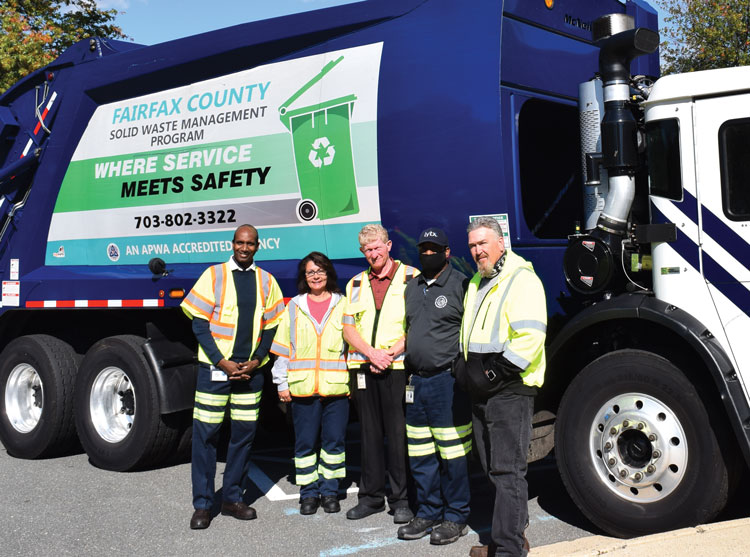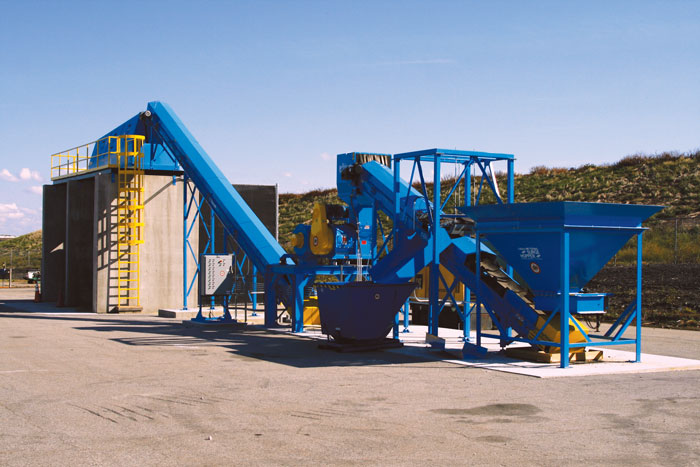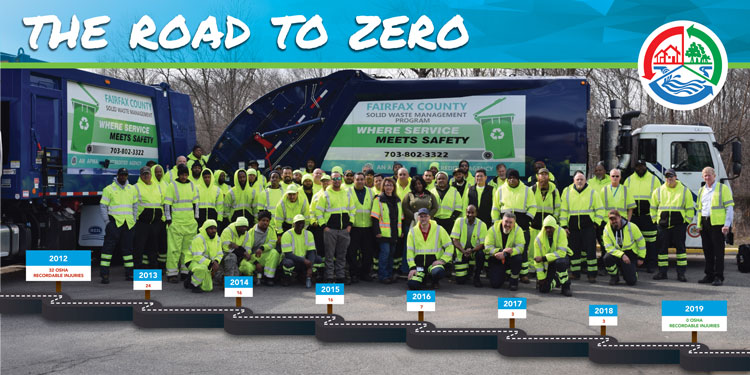Through its innovative programs, community outreach, and a revamped safety program, Fairfax County’s Solid Waste Management program continues to stay ahead of industry trends and standards, and to implement efficient, yet effective, ways to provide services to the community that help maintain a clean, safe and healthy environment.
Fairfax County, VA covers an area of 406 square MILES, with approximately 1.2 million residents. The county’s Solid Waste Management Program (SWMP) began operating as part of an earlier public health agency in the early 1960s. Today, the program collects residential recycling in sanitary districts representing approximately 45,000 single-family homes, or about 10 percent of county residences, with the remaining 90 percent served by private industry. The program also collects from most county-owned properties, including operating facilities (e.g., libraries, fire stations) and multi-family properties managed by the county’s Department of Housing and Community Development. SWMP operates and maintains approximately 250 registered vehicles, including standard passenger vehicles and transfer trailers. They also own an additional fleet of 75 pieces of off-road equipment (e.g., bulldozers, tractor mowers) at its three permanent facilities: the I-66 Transfer Station, the I-95 Landfill Complex and the Newington Collections Facility.

Fairfax County requires residents to recycle paper, including cardboard, plastic bottles and jugs labeled PET #1 and HDPE #2, and aluminum and steel cans. The SWMP also accepts electronic waste, scrap metal, white goods, household hazardous waste, paint, fats, oils, and grease for drop-off at I-66 and I-95. Bicycles in good condition can also be donated for reuse through a partnership with the nonprofit, Bikes for the World. The county also picks up yard waste, which is collected separately in reusable containers, paper bags, or in bulk, and processed into mulch and compost. Wood and leaf mulch are available to residents free of charge.
Residents recycle glass through the Purple Can Club (PCC), a popular program named for its distinct, purple-colored drop-off containers. The PCC maintains 42 drop-off locations throughout Northern Virginia and was initiated because there was no market for glass recovered from the single-stream system used throughout the county. The original concept was to crush and screen the glass for use in a variety of construction and other technical applications, such as gravel for road base and pipe bedding, and as filter media in wastewater treatment systems. However, the cleanliness of the material being recovered by the program has made PCC glass suitable for direct shipment to interim processors, who are selling the glass onward as feedstock to the manufacturers of glass bottles and jars and other higher/better use applications. Due to the success of the program, 10 neighboring jurisdictions have joined the PCC, with the program to date recovering almost 15,000 tons of glass otherwise bound for disposal as MRF residue.

Right: Messaging on public-facing equipment is a common feature of the Fairfax County fleet. This example gives thanks to frontline workers, initiated during the height of the COVID pandemic.
The increasing demand for organics diversion also prompted SWMP to offer drop off opportunities for food scrap composting on a pilot program basis, establishing two permanent drop-off locations at its two disposal and recycling facilities. This pilot has been a major success. Due to its popularity, they have already diverted nearly 66,000 pounds of food scraps from disposal. Beginning in June 2021, SWMP expanded the pilot to include drop-off centers at four local farmers markets, and, in three short months, the additional locations have captured an additional 17,000 pounds of food scraps.

Collected glass containers are loaded into the hopper on the right, and travel through the processing equipment, recovered as screened, clean sand and gravel on the left.
In April 2021, Fairfax County implemented a ban on using plastic bags for yard waste storage and collection to keep plastic inclusions from the composting process being introduced or re-introduced into the environment and contributing to pollutant air emissions due to manufacture transport, etc. It also comports with the community’s desire to promote a more circular economy. Instead, residents and businesses are required to use paper yard waste bags or reusable
containers.
Proactive Waste Management
According to John Kellas, SWMP Deputy Director, the impact of COVID-19 has had a negative impact on the organization, principally with regard to a significant increase in waste volumes being managed by county collection resources, while an already-chronic hiring and attendance problem was further exacerbated by the pandemic. “The worker health considerations, which effectively eliminated the use of manual labor in collection operations, reduced crew sizes, and forced collections to a containers-only set-out requirement only further compounded already challenging conditions. To offset these challenges, the program invested considerable resources in safety training, outreach, and education to workers, and the use of additional PPE and cleanliness procedures. There was also a significant investment in real-time communications with customers and private-industry collections (e.g., weekly updates on program status).” Kellas explains that SWMP gives updates daily on the status of collections such as yard waste, and as often as needed in other areas, using e-mail, customer service employees, social media, the county website and communications distributed by the Board of Supervisors. Some local private-industry collectors also have used robo-calls to dissemination critical messages. In addition, SWMP has offered a more liberal use of enforcement discretion and the suspension of selected regulations to ease the burden on the collections industry and encourage the most efficient use of diminished resources. “Every action has helped in some way, but we are still having to manage the situation daily to ensure waste collection in the community. We have found that
effective communication is one our best tools to keep our community informed.
“Another measure taken in response to COVID, which is exacerbating the ongoing chronic labor shortage that has hobbled American industry, is that the county recently provided some additional relief to local service providers on mandatory collection of source-separated yard waste for composting. Collectors are now permitted, if necessary due to staff shortages, to collect yard waste with refuse,” says Kellas. “This allowance is intended to assist in the timely and reliable collection of all waste set out by residents. With the impending surge of yard waste expected in the Fall, the temporary change was re-evaluated in mid-October. Given the continuation of the labor shortage for both private and public service providers, this change will likely remain in effect through the remainder of the year.”

The Journey Through Challenges and Improving Employee Safety
A significant challenge that SWMP previously faced was in February 2017 when the local Covanta-Fairfax waste-to-energy facility—the county’s primary disposal site—was ravaged by fire. The Fire Marshal’s investigation did not identify a specific cause, but the facility was rendered inoperable as a result, so the SWMP trucked 625,000 tons of solid waste to a landfill 60 miles south of the county for nearly a year while the Covanta facility was rehabilitated. Hans Christensen, Division Director, Solid Waste Operations, says “We were able to execute an emergency hauling contract using local haulers to assist county staff in transferring the waste to out of county landfills in Virginia while the facility was shut down.”
Currently, SWMP is dealing with labor shortages, despite an ongoing recruitment program. Given the state of the industry, SWMP recognizes that the issue is more far reaching than just Fairfax County. So, they have produced their own hiring video that is embedded in their job advertisements, tractor trailer advertising and placed a continuous ‘for hire’ advertisement for drivers. SWMP’s training program is led by a 25-year experienced solid waste professional who facilitates classroom and on the job training for new and existing CDL drivers.
Despite these challenges, SWMP is proud of what is has accomplished over the years. “The strength of any organization is dependent on a myriad of factors, but a primary key to sustainable success is the safety and health of its employees,” says Dennis Batts, Program Manager, Emergency Operations and Safety, SWMP. “The solid waste industry has the unfortunate distinction of being amongst the nation’s deadliest jobs, and SWMP’s Operations Division struggled for years with relatively high incidences of job-related injuries. Leadership came to realize to turn that around, it had to profoundly change the way worker safety was managed.” In 2013, the program began the journey to what is likely its most outstanding achievement—a revamped safety program that put a premium on identifying the hazards and risky behaviors that were driving injury and accident rates. Creating an expansive, full-time safety program with professionally trained staff and independent authority to oversee occupational health and safety, and advocate for operational changes, SWMP has seen a steady decrease in OSHA recordable injuries in its collection operation from 32 in 2012 to zero in 2019.
To get there, the safety program had to break through old assumptions. SWMP took safety out of the shadows and began actively and openly engaging staff on the challenges and concerns. “The program identified gaps and began revising operations with a focus on five major components: 1) training and evaluation, 2) staff engagement, 3) risk reduction, 4) monitoring and coaching, and 5) metrics and accountability. What followed was a willingness to try new approaches without fear of failure. Creativity led and success followed. Workers began to understand that they held the key to their own safety, and it would be as much their words and actions that would ensure everybody went home safely each night,” explained Batts. Validation of the improved statistics that were the result of these efforts came in the form of recognition from SWANA (2017 Biggest Safety Improvement) and Lytx (multiple top driver and coaching awards from 2015-2020).

Future Goals
Currently, the county is in the process of purchasing four new electric vehicles—two rear-load collection trucks and two transfer tractors. The purchases are being funded through a grant from the Virginia Department of Environmental Quality’s Clean Air Communities Program. The grant is covering 75 percent of the cost and the Department of Public Works and Environmental Services is paying the balance. The transfer station, landfill and collection program’s operations facility will all have charging capabilities.
The county is also working with a private entity to build a five-megawatt solar array on a closed portion of its I-95 landfill in Lorton. Electricity produced at the site will be distributed to county facilities via Dominion Energy transmission lines through a virtual net mentoring agreement. The project is slated to begin operation in late 2023.
SWMP plans to further expand its current food scrap drop-off programs to combine food scraps with yard waste in municipal curbside collections. An agreement with Prince William County will divert this material to regional composting facilities and eventually to a biodigester. Eric Forbes, Division Director, Solid Waste Compliance says, “SWMP is always looking at ways to implement measures to help achieve our overarching goal to be good stewards to our community and our environment.”
According to Kellas, despite the current climate, the program is solid, “Overall, we have a very strong program and have been doing great work in the county for many years. Because there is always room for improvement, we are continuously looking for ways to be innovative, to stay abreast of industry trends and standards, and to implement efficient, yet effective, ways to provide services to the community that help maintain a clean, safe and healthy environment, which is what residents of Fairfax County expect and deserve.” | WA
For more information, contact Sharon North, Section Chief, Communications, at (703) 324-8455 or e-mail [email protected].
